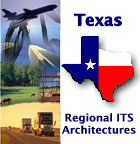| 8.0 | MAINTENANCE AND CONSTRUCTION MANAGEMENT |
| 8.1 | MAINTENANCE AND CONSTRUCTION OPERATIONS |
| 8.1.1 | Maintenance and Construction Operations shall provide a Maintenance Vehicle Fleet Management (MVFM) function to schedule and dispatch, monitor and track location, and monitor operational condition and maintenance requirements of public and contracted fleets of maintenance, construction, and specialized service vehicles. This function includes interactions among Traffic Managers, Supervisors, Dispatchers, Field Crews, Construction Crews, Vehicle Maintenance Crews, Equipment Maintenance Crews, Weather Services Organizations, and Information Service Providers. |
| 8.1.1.6 | MVFM shall be capable of providing dispatchers and operators of maintenance, construction, and specialized service vehicles with information regarding potential and actual roadway problems. |
| 8.1.1.6.1 | MVFM shall provide information to dispatchers and vehicle operators, including but not limited to: |
| 8.1.1.6.1(d) | Environmental conditions |
| 8.1.1.6.2 | MVFM shall be capable of filtering, fusing, processing, and presenting data from multiple weather and environmental sources. |
| 8.1.1.6.3 | MVFM shall be capable of receiving fused weather and roadway information from external sources, including but not limited to: |
| 8.1.1.6.3(a) | Surface transportation sources |
| 8.1.1.6.3(b) | Weather service organizations |
| 8.1.1.6.6 | MVFM shall support transmission of fleet operations data to other Operations centers. |
| 8.1.1.6.7 | MVFM shall support transmission of fleet operations data to archives. |
| 8.1.2 | Maintenance and Construction Operations shall provide a Roadway Management (RWM) function to monitor traffic, road surface, and environmental conditions and forecast traffic and road surface conditions to support management of routine and hazardous road condition remediation and to communicate changes in conditions. This function includes interactions among Traffic Managers, Supervisors, Dispatchers, Field Crews, Construction Crews, Asset Managers, Planning Agencies, and Weather Services Organizations. |
| 8.1.2.1 | RWM shall support a number of different services, including but not limited to: |
| 8.1.2.1(a) | Winter maintenance (plowing, treating, anti-icing, de-icing, etc.) |
| 8.1.2.1(b) | Hazard removal (removing trash, animals, etc.) |
| 8.1.2.1(c) | Emergency activities (incident response, planning, alternate routing, etc.) |
| 8.1.2.1(d) | Routine maintenance activities (cleaning, cutting, etc.) |
| 8.1.2.1(e) | Repair activities |
| 8.1.2.1(f) | Other weather related activities (fog dispersion, etc.) |
| 8.1.2.4 | RWM shall determine the need for forecasted and scheduled roadway treatment. |
| 8.1.2.4.1 | RWM shall be capable of filtering, fusing, processing and presenting data from multiple weather and environmental sources. |
| 8.1.2.4.2 | RWM shall be capable of receiving and fusing weather and roadway information from external sources, including but not limited to: |
| 8.1.2.4.2(a) | Surface transportation sources |
| 8.1.2.4.2(b) | Weather service organizations |
| 8.1.2.4.5 | RWM shall support short-term weather prediction for winter maintenance. |
| 8.1.2.6 | RWM shall track the amount of materials applied to the roadway for comparison to planned / forecasted requirements. |
| 8.1.2.7 | RWM shall monitor the amount and availability of materials at storage facilities. |
| 8.1.3 | Maintenance and Construction Operations shall provide a Work Zone Management and Safety (WZMS) function, which provides support for the effectiveness, safety, and efficiency of roadway operations during all work zone activities. This function includes interactions among Traffic Managers, Supervisors, Dispatchers, Field Crews, Construction Crews, Public Safety Organizations, Information Service Providers, and Travelers. |
| 8.1.3.1 | WZMS shall monitor, control, and direct activity in the vicinity of work zones. |
| 8.1.3.1.1 | WZMS shall provide information about work zones, including but not limited to: |
| 8.1.3.1.1(a) | Anticipated delays |
| 8.1.3.1.1(b) | Alternate routes |
| 8.1.3.1.1(c) | Suggested speed limit |
| 8.1.3.2 | WZMS shall support the management of data about work zones. |
| 8.1.3.2.1 | WZMS shall collect information concerning work zone activities, including but not limited to: |
| 8.1.3.2.1(a) | Location |
| 8.1.3.2.1(b) | Nature / type |
| 8.1.3.2.1(c) | Scheduled start time |
| 8.1.3.2.1(d) | Duration |
| 8.1.3.2.1(e) | Lane shifts |
| 8.1.3.2.1(f) | Staging areas |
| 8.1.3.2.1(g) | Length of work zone |
| 8.1.3.2.1(h) | Scheduled phases of work zone configuration |
| 8.1.3.2.1(i) | Alternate routes |
| 8.1.3.2.1(j) | Anticipated delays for travel route |
| 8.1.3.2.1(k) | Anticipated delays for diversion route |
| 8.1.4 | Maintenance and Construction Operations shall provide a Roadway Maintenance Conditions and Work Plan Dissemination (RMCWPD) function to provide Intra- and Inter-agency coordination of work plans. This function includes interactions among Traffic Managers, Supervisors, Planning Agencies, Public Safety Organizations, and Information Service Providers. |
| 8.1.4.1 | RMCWPD shall coordinate information on planned maintenance and construction activities, including work zone information, and unplanned remediation activities, such as inclement weather responses, so that routing, scheduling, and resource allocation can be accomplished. |
| 8.1.4.3 | RMCWPD shall coordinate information with other transportation agencies, including but not limited to: |
| 8.1.4.3(a) | Public Safety |
| 8.1.4.3(b) | Emergency Medical Management |
| 8.1.4.3(c) | Transit |
| 8.1.4.3(d) | Traffic Management |
| 8.1.4.3(g) | Information Service Providers |
| | |












 Web Spinner Technology.
Web Spinner Technology.